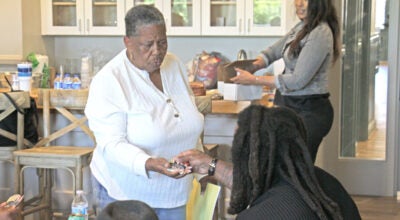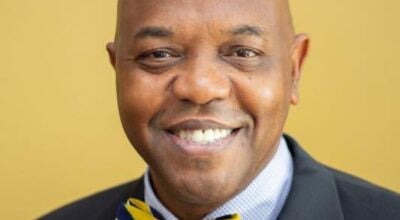Selma native, business leader Otha Carneal dies
Published 2:26 am Saturday, October 11, 2008
Friends of retired Selma businessman Otha Carneal were saddened to learn of his death Friday in Opelika, where he has resided for the past few years. Although funeral plans are incomplete, a memorial service in Church Street United Methodist Church will be held at a date to be announced, according to his daughter Kay Carneal Phillips of Opelika.
He was a longtime employee and later volunteer at Old Depot Museum, filling the position of cataloguer on the retirement of curator Sam O’Hara.
“I had promised Sam to catalogue the artifacts,” he said during an interview years before his death. “I kept my promise and found other things there to keep me busy.”
He framed and hung many of the hundreds of photographs on display, arranged exhibits and at times, delighted visitors with his tales of old Selma.
Carneal was born at the old Vaughan Memorial Hospital on what he termed “All Fools Day” in 1918. In an earlier reminiscence, he said his life in the unsophisticated, genteel-mannered town of the early 20th century “was marked by several noteworthy accomplishments. I was captain of the first school safety patrol in Alabama, at Dallas Academy.” A photograph in the schoolroom of the Old Depot Museum attests to the truth of his statement.
He was in junior high school when the Great Depression stunned the country, but recalls growing up in the Riverview neighborhood as some of his happiest memories.
“There were no socially elite families living around us,” he said. “There were good people who took care of their property, swept the sidewalks and the street in front of their houses every day, raked leaves and burned them and kept their grass cut. We knew everybody in the neighborhood, and we did things for each other. If someone were sick, neighbors took them homemade soup or whatever was needed. We shared good times and bad.
“And children were taught to respect property and authority, to be courteous and thoughtful of other people.”
Riverview in those days was filled with children, Carneal recalled, smiling as he reminisced.
“We played in groups out in the street because there was almost no traffic, very few cars. We had a ball diamond on the corner of the first block of Alabama and another on the second block of Water Avenue, the northwest corner. In the summer we played ball, rode bicycles and skated. When boat whistles blew, we’d stop whatever we were doing, run to the riverbank and wave at the captain.”
In the cool of the evening of the long summer days, neighborhood children “played out” at first dark, under the corner streetlights.
“Our parents sat on the front porch under the ceiling fan and visited while keeping an eye on us. We played ‘Indian School’ on the front porch steps,” he said, “and ‘Red Light’ and ‘May I?’ in the street. After school and on Saturdays our favorites were cowboys and Indians and rubber gun wars.
“And everybody had a bicycle, which we rode everywhere. Never heard of a bicycle being stolen.”
Later, Carneal worked at the YMCA after school, earning his membership that way. When he graduated from Selma High School he went to work in the cotton business with Hohenberg. After three years he joined his father at Selma Electric Battery Co., which the senior Carneal had started in 1927 on Water Avenue, where the Carneal’s building is still located, although now empty.
Another of the noteworthy events in his life, he commented proudly, occurred in the 1930s when his father replaced the two water fountains in his business with one to be used by all.
He always added that “the most important event in my life was on July 12, 1939, when I married Mary Steele Herrington.”
His wife died several years ago, shortly after their move to the Auburn-Opelika area.
America went to war in 1941, and in 1942 Carneal joined the Army Air Corps at Craig Field, where he spent two and half years before being sent to the India-China-Burma Theatre. The Carneals’ only child, Kay Phillips, was born during the war.
Upon his return to Selma, his father chose semi-retirement, and Carneal bought the business, which became known as Carneal’s. He assumed an active role in the civic and church life of the community, serving two terms as president of the Chamber of Commerce and several as a director.
He served as a member of the Committee of 100, which brought Hammermill to Selma, chaired the survey for the Selma Downtown Revitalization Project and co-chaired Riverfront Market for several years.
Business associate and friend Milam Turner of Turner Chevrolet-Buick, upon learning of Carneal’s death, said “Otha Carneal was a man of integrity in all his business dealings. When I came back to work in 1957 his business was respected for quality work in Selma. Otha will be greatly missed in Selma and Dallas County, where I still think of his being.”
Carneal’s fellow church members at Church Street Methodist commented Friday on his death.
Kathryn Tucker Windham said “Otha taught one of my children — I think Dilcy — in Sunday school. He was such a good teacher, such a good friend to us. He not only enjoyed his association with the church, he helped everyone else enjoy it.”
Edie Morthland Jones commented “Otha Carneal loved this town, loved the people and always put others first. He had a great sense of humor, and he was a true Southern gentleman.”
Bruce Burson knew him “in business at Carneal’s and at the church. He was an honorable man with high moral standards. I enjoyed him as a friend and as a fellow worker at Church Street. He has been missed in Selma.”




